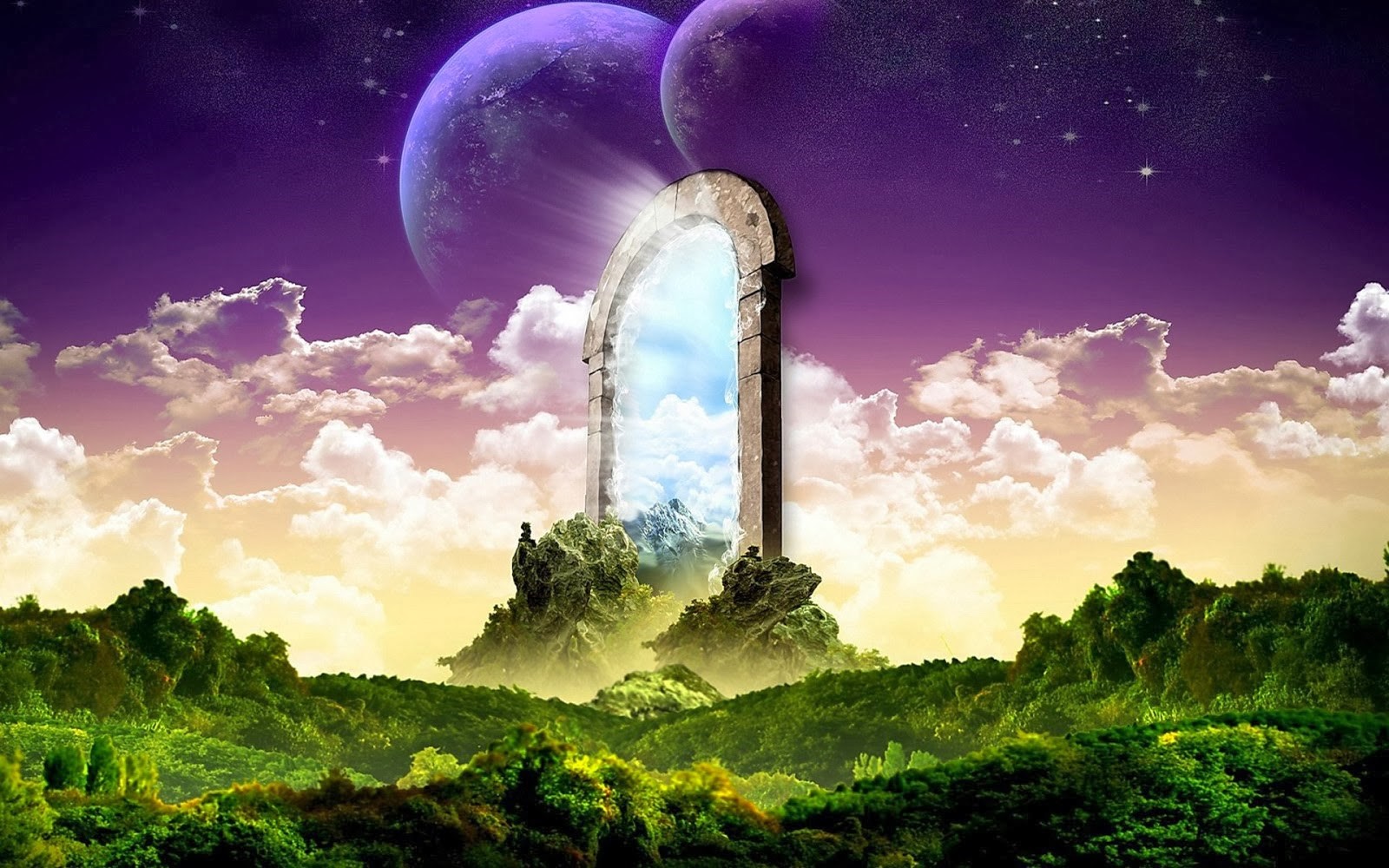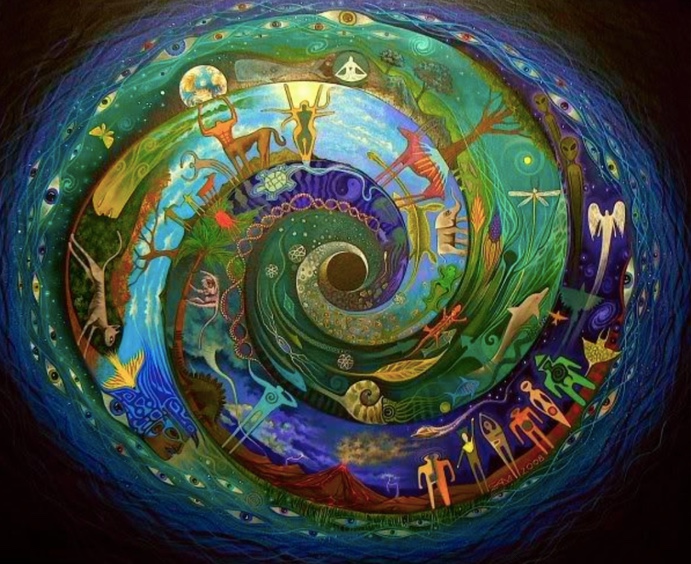It is believed by many that we reincarnate into different forms. What of us remains after we die and continues on?
We do not end after our physical bodies shrivel and turn to ash. The body dies, but the soul does not. This part of us continues on in the form of our astral bodies, called the Devaloka or Second World. Without going into the myriad philosophical descriptions of the Second World, this is where the remains of our person – our soul – decides what to do next.
The Astral & Causal Bodies
The memories of the soul are carried within the astral body. This is distinct from the causal body, and the physical body.
Paramahansa Yogandanda says in his book, Karma and Reincarnation,
“The physical body contains, hidden, two other bodies, the astral body and the spiritual (idea) body. If a pint of salt water is put into a jug and corked, and this then is placed into another larger jar and corked, and these two jars are put finally into a third, larger jar and corked, and these three jars are then placed into the ocean, the salt water in the inner jars cannot mingle with the sea water when the outer most jar is broken.
“All the three imprisoning jars must be broken to allow the water to merge back into the ocean. Likewise, the physical body has the astral body and the ideational body, or causal body within it; the soul is encased finally, within the idea body and corked with ignorance.”
Therefore, the physical body is not yet free when we die. There are still layers of our previous experience which must be shrugged off.
Out-of-body experiences, and near-death-occurrences are usually the memory of the experiences of the astral body when it re-enters physical form.
These have even been described scientifically, and photographed using fMRI imaging. Andra M. Smith and Claude Messierwere from the University of Ottawa described one subject’s ability [to experience their astral body] in their paper, published in Frontiers of Human Neuroscience:
“She was able to see herself rotating in the air above her body, lying flat, and rolling along the horizontal plane. She reported sometimes watching herself move from above but remained aware of her unmoving “real” body. The participant reported no particular emotions linked to the experience.”
In other words, our astral bodies having “an experience” is just business as usual.
Understanding the difference between the causal and the astral bodies can help us to understand the phenomenon of reincarnation.
The soul, which is the pure reflection of Spirit, appears on the causal plane, not the astral plan.
The soul’s astral desires which encase and limit it allow for the astral body to exist (as in Yogananda’s metaphor). Those desires must still be worked out on the astral plane. When the soul’s journey upon the astral plane achieves its natural end, the astral body is shed and the soul rises for rest to the causal plane there to re-incarnate back to the astral plane if there still any astral desires.
Once the soul has shed all physical and astral desires it moves to the causal plane, known as the bliss plane, at which the only remaining “desire” is the separateness of the pure Soul from Spirit. The soul can merge back to God easily from the casual plane, and no longer needs to reincarnate into physical form. We literally step into the physical according tot these rules.

Reincarnation and Karma
Adi Shankaracharya, a post-Vedic philosopher in his commentary on the Brahma Sutras, says the actions of the soul go infinitely far back (some might call this karma):
“For although the activity of the soul is not independent, yet the soul does act. The Lord [Infinite Oragnizing Principle of the Multiverse] indeed causes it to act, but it acts itself. Moreover, the Lord in causing it to act now has regard to its former efforts, and he caused it to act in a former existence, having regards to its previous efforts in that existence; a regression against which, considering the eternity of Samsara, no objection can be raised.”
Translation – the soul chooses what life to incarnate into next, as it has an infinite number of lessons based on its previous choices which it desires to learn, thereby lessening the cycles of additional rebirth into material form before returning to the Infinite from which it came. The soul chooses certain lessons, even difficult and painful ones, because if they do not, the lesson will remain, to be learned at some future time within the soul’s cycle of life and death.
This is also why a soul may remember its previous lifetimes, people, places it has lived and more. They are carried with them beyond the physical brain.
In “Have We Really Lived Before?”, Michael C. Pollack, Ph.D., CCHT describes a lower back pain, which grew steadily worse over the years and limited his activities. He suggests a possible reason for this recurring pain:
“I discovered that I had lived at least three prior lifetimes in which I had been killed by being knifed or speared in the low back. After processing and healing the past life experiences, my back began to heal.”
Divine Grace
Divine Grace makes these lessons as palatable as possible, while still making sure that the lessons we choose to learn have every opportunity to be embraced fully. Divine Grace overrides the laws of karma, and even reincarnation.
Edgar Cayce explained,
“The law of grace supersedes the law of karma. If at one point we realize that we have done wrong and have truly learned our lesson, we may find ourselves dealing with the intervention of grace. This is when we can ‘dodge’ the corrective action of karma because we have come to realize that what we have done is wrong, and we go to work fixing this. However, grace is not an excuse to avoid our responsibilities and make up for them later. It only comes to us when we have truly gained understanding, and we move to use that understanding in our lives.
“Awareness of grace can come to us when we are facing a difficult situation and we call out for help. At that moment, it may feel as if someone has lifted an enormous weight off our shoulders, or we feel as if everything is going to be all right. It can come to us at a time when we feel down and suddenly we find the strength to continue, or in a moment of inspiration. Opening ourselves to grace can make our paths easier to travel.”
In summary, we are not our physical bodies. Our physical bodies are the pretty package that we get to be in while we work out our astral desires (which, while we are growing in consciousness, are other than a desire to reunite with the Formless Infinite Creative Force, or God.) As we shed all our desires, and the lessons associated with them, we no longer need to reincarnate.
As we do, we take with us all impressions of all our previous lives, as these were imprinted upon our causal and astral bodies and go with us from one form to another.
The many saints and sages we have experienced on the earthly plane are merely incarnations working out their last vestiges of desire and attachment before merging into the Oneness. We will follow them when our own karma (really just another word for our most commonly held beliefs and actions) closely resemble theirs.
This article (Which Part of Us Actually Reincarnates, and Why?) is a free and open source and can be re-published anywhere with proper attribution to the author and Themindunleashed.com.


